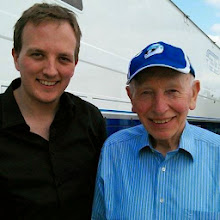According to Jakob Nielsen there are five rules that journalists should obey when it comes to headline writing, and in particular, headline writing for the web.
They are:
1. Keep it short. Don't use too many words because people read quickly on the internet and want headlines that are short and easy to read.
Sky Sports' headline here is a good short story that will make people stop and read. Four words that will attract a reader because of who and why.
2. Summarise. Every word must tell part of the story so ensure that every word in the headline does its job and gives the reader as much information as possible.
The Sun here have summarised up Alex Ferguson in an interview discussing the form of Rio Ferdinand after his mistake in the Ukraine on Saturday night.
3. Most important words at the beginning. Tell as much of the story as possible with the most important facts at the beginning. The BBC do a good job of this, as the headline shows. It gives away the most important part of the story at the start -
Newsagents warn Labour.
4. Make it understandable out of context. The headline should be able to summarise the story so even without reading the article the reader knows the most important facts and has an idea of what it is about. Once again the
BBC come up trumps with a headline that tells the reader the one fact in the article that actually matters.
5. Predictability. So the reader knows from the headline whether they will like the article or not.
This is the only category the
Daily Mail succeeds in, giving its tendancy to write a headline that is so long, it's surprising they have any information left for the article.
The BBC headlines are the best. They tick all five boxes that Nielsen suggests the headlines need to follow. Reading various headlines, I do agree with Nielson that headlines should conform to the rules he suggests.
 This image is 200x500 pixels big and has been cropped to show the entrance to the museum, to keep the photo as recognisable as possible
This image is 200x500 pixels big and has been cropped to show the entrance to the museum, to keep the photo as recognisable as possible This version is 400x300 pixels and therefore can show more of the entrance to the museum.
This version is 400x300 pixels and therefore can show more of the entrance to the museum. For the 100x100 pixel i focused on the logo, which is located on the outside wall of the shop next to the entrance. I chose this because the logo was the most obvious and recognisable part of the photo compared to the building desgin.
For the 100x100 pixel i focused on the logo, which is located on the outside wall of the shop next to the entrance. I chose this because the logo was the most obvious and recognisable part of the photo compared to the building desgin. This is the original photo, showing the complete image with all part of the museum and rest of Deepdale football stadium which could fit into view. From the photo it is possible to see where each of the small photos were cropped to.
This is the original photo, showing the complete image with all part of the museum and rest of Deepdale football stadium which could fit into view. From the photo it is possible to see where each of the small photos were cropped to.

